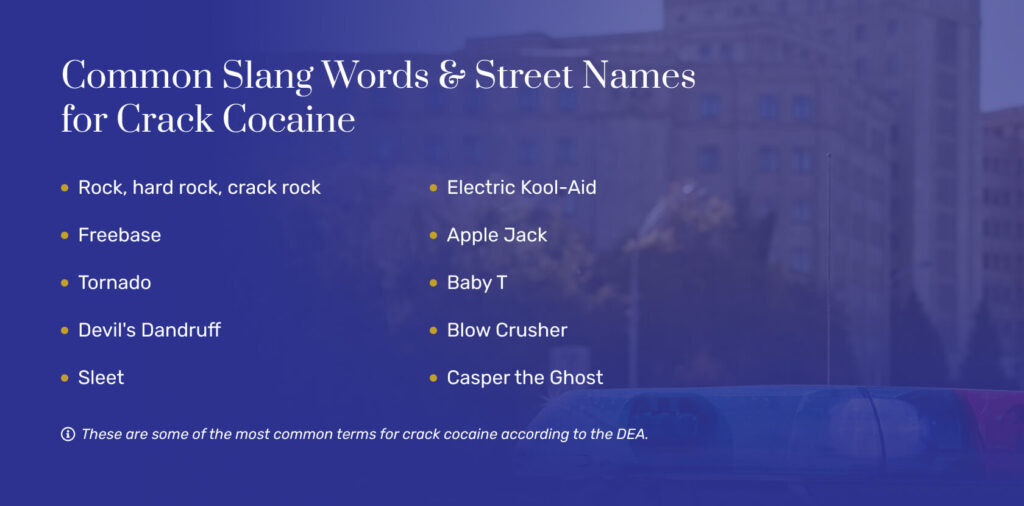Crack cocaine street names include rock, base, soap, bones, and sleet, among others
The Need for Slang & Street Names
Crack cocaine, a derivative of the powerful stimulant cocaine, has carved a devastating path through communities and become a symbol of addiction and destruction. In an effort to keep it hidden from authorities and those who might want to eradicate it from their neighborhoods, a language of code words has developed over the years and been implemented by those who want to sell the drug as well as those who want to use it without detection.
Those struggling with crack cocaine addiction can find structured detox and therapy through a New Jersey drug rehab center that provides evidence-based treatment and ongoing recovery support.
4.8 million people in the U.S.
1.7% of the population aged 12+ reported using crack cocaine in their lifetime (NSDUH, 2021).
Crack cocaine, also known as crack, first emerged on the scene in the 1980s, rapidly gaining infamy as a cheap and highly addictive substance. Unlike powdered cocaine, which is typically snorted, crack is derived from cocaine hydrochloride and transformed into a solid rock crystal that can be smoked.
This process involves mixing cocaine with baking soda or ammonia and water, resulting in the formation of small, hard pellets or “rocks”. The name crack derives from the cracking sound produced when the rocks are heated and smoked.
According to the National Survey on Drug Use and Health (NSDUH), in 2021, approximately 4.8 million people or 1.7% of the U.S. population, aged 12 or older have reported using crack cocaine during their lifetime. Crack cocaine’s rise to prominence coincided with a wave of urban decay and economic disparity in many inner city neighborhoods.
To navigate the risky landscape of the drug trade, individuals developed a rich and intricate vocabulary to discuss crack cocaine discreetly. This language, often referred to as crack slang, served as a code that allowed users, dealers, and those involved in the trade to communicate covertly, evading law enforcement and minimizing the risks associated with their activities.


Signs of Crack Cocaine Abuse
The Diversity of Slang for Crack
The lexicon of crack cocaine slang is as diverse and ever-evolving as the communities that use the drug. Some terms reflect the physical characteristics of the drug, such as rocks, hard rock, or ready rock, which allude to the crystalline form of crack cocaine.
Others draw metaphoric connections, such as devil’s dandruff or white tornado metaphorically depicting the chaos and destruction that often accompany crack use. Euphemisms like soap, bones, or ice cubes provide a cloak of innocence, allowing individuals to discuss crack cocaine discreetly in public.
Moreover, the slang associated with crack cocaine extends beyond the drug itself. It is used to describe the act of smoking crack, the paraphernalia involved, and the behavioral and physiological effects experienced. For example, chasing the dragon refers to the act of inhaling crack smoke, while base pipe or crack stem denotes the tube or apparatus used to smoke the drug.
While some of these terms sound harmless, it is essential to recognize the destructive power that crack cocaine holds. Behind the veil of euphemisms and slang lies a harsh reality. Crack is a drug that engulfs lives, perpetuates cycles of poverty and crime, and undermines the global economy.

Common Street Names & Slang Words Used for Crack Cocaine
Depending on where you are in the country, slang words used to describe the act of using crack and the drug itself will vary widely, and new ones are created all the time. Now that texting is so prevalent, there are even emojis used to cloak communication about the drug.
Some of the most common terms for crack cocaine include the following:
| Crack | The most common term of all, it is a straightforward nod to the sound made when the drug is lit and smoked. |
| Rock | This name comes from the solid crystalline form that crack cocaine takes. |
| Hard rock | In this term, hard references both the drug and the person who uses it. |
| Base | This word hints at the alkaline properties of crack cocaine. |
| Ready rock | Ready could reference how easy it is to make or how people feel when they take it. |
| Freebase | This term refers to the process of converting cocaine hydrochloride into a smokable form. |
| Tornado | Tornado references the rush of euphoria that comes with the use of crack. |
| White tornado | A twist on tornado, this could be a regional term evolved to denote crack coming from a specific drug maker or dealer. |
| Devil’s dandruff | Crack slang is not without humor, and this term falls into that category. |
| Soap | Using words like soap to refer to crack allows users to openly discuss use or sale of the drug in public without fear of getting caught. |
| Bones | It’s unknown where this term originated, though the density and color of crack may have contributed to using the word bone to refer to it. |
| Ice cubes | Similarly, because crack can look like ice or bone, it may be referred to as an ice cube, but it is important to note that ice is a common slang word for crystal meth as well. |
| Sleet | Again, like ice or bones, this word references the appearance of crack. |
| Electric Kool-Aid | A nod to the counterculture of the 1970s, this term alludes to crack’s potency. |
These street names and slang terms are commonly used among those who use the drug, though different regions use some more than others or alter them slightly to be more specific to their locale. For those seeking help with crack cocaine misuse or related stimulant addiction, a Florida addiction treatment center offers individualized detox, counseling, and relapse prevention programs to promote lasting recovery.
If you are concerned that your loved one is using crack and you hear them use these words in conversation, on social media, or in texts, it could be an indicator that it’s time to connect with treatment.
- Crack Cocaine Fast Facts. (January 2006). National Drug Intelligence Center.
- Crack in Context: America's Latest Demon Drug. University of California Press.
- The Meaning of the Term "Cocaine Base" in 21 U.S.C. § 841(b)(1): A Circuit Split Over Statutory Interpretation. (2010). Duquesne Law Review.
- 2021 NSDUH Annual National Report | CBHSQ Data. (January 2023). Substance Abuse and Mental Health Services Administration.
- Cocaine DrugFacts | National Institute on Drug Abuse (NIDA). (April 2021). National Institute on Drug Abuse.
- Cocaine. University of California.
- Cocaine Research Report: What Is the Scope of Cocaine Use in the United States? (May 2016). National Institute on Drug Abuse.
- Slang Terms and Code Words: A Reference for Law Enforcement Personnel. (July 2018). DEA Intelligence Report.
















